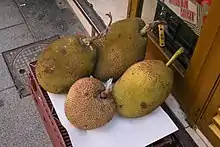Artocarpus tamaran
Artocarpus tamaran, also known as elephant jack in English, tarap tempunan in Malay, and more locally as timbangan, tamaran, entawa or wi yang, is a species of flowering plant, a fruit tree in the fig family, that is native to Southeast Asia.[2]

| Artocarpus tamaran | |
|---|---|
_(8082540008).jpg.webp) | |
| Scientific classification | |
| Kingdom: | Plantae |
| Clade: | Tracheophytes |
| Clade: | Angiosperms |
| Clade: | Eudicots |
| Clade: | Rosids |
| Order: | Rosales |
| Family: | Moraceae |
| Genus: | Artocarpus |
| Species: | A. tamaran |
| Binomial name | |
| Artocarpus tamaran | |
Description
The species grows as a monoecious tree to 40 m in height, with a bole of up to 10 m, buttresses to 3 m, and with white latex. The oval leaves are 27–35 cm long by 10–18 cm wide. The globular inflorescences occur in the leaf axils. The fruits are cylindrical or oblong syncarpous infructescences, 10–15 cm by 5 cm in diameter, covered by short, flexible spines, and ripening yellowish. The seeds are covered by an edible, sweet, white aril.[2]
Distribution and habitat
The species is endemic to Borneo, where it occurs naturally in lowland, coastal and hill mixed dipterocarp forest, as well as in secondary forest, up to an elevation of 600 m.[2]
Usage
The fruits of this species are eaten. The bark was once extensively used for making barkcloth by the Muruts and other Borneo tribal people.[2]
References
- Chadburn, H. (2018). "Artocarpus tamaran". IUCN Red List of Threatened Species. 2018: e.T86533435A86533443. Retrieved 14 April 2022.
- Lamb, Anthony (2019). A guide to wild fruits of Borneo. Kota Kinabalu: Natural History Publications (Borneo). p. 184. ISBN 978-983-812-191-0.
